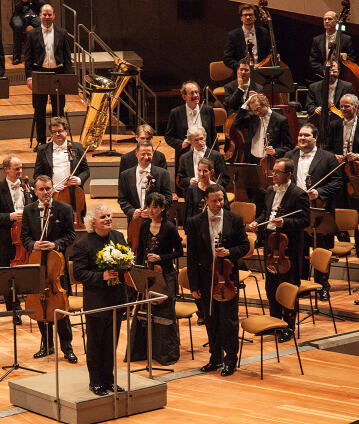Simon Rattle conducts Sibelius’s Symphonies Nos. 1 and 2

“Clear-sighted and fervent” was how the press described the interpretation of all Sibelius’s symphonies presented by the Berliner Philharmoniker and Sir Simon Rattle in February 2015. On this first night of the cycle, the programme included the First and the Second Symphonies – decidedly late Romantic works whose expressiveness is likely to have been inspired by Tchaikovsky’s only slightly older Pathétique.
Already at an early point in his career, when still principal conductor and artistic advisor of the City of Birmingham Orchestra, Sir Simon Rattle intensely explored all of Jean Sibelius’s symphonies; with the Berliner Philharmoniker, he first presented the cycle in 2010. The 2014/15 season saw the seven Sibelius symphonies on the Philharmoniker’s programme once again – works in which the Finnish composer made use of techniques he had tried out in his symphonic poems reflecting on the Kalevala. Sibelius transferred in particular to his symphonies without programme the rhapsodic basic character of those pieces circling around the myths and heroic sagas of the Finnish national epic – in the sense of a narrative, impromptu development of ideas.
He at first stuck with the traditional four-movement form; particularly in the extremely melodic and emotionally deeply felt First Symphony one gets the impression that a moving story is being told in various characteristic tableaux. The introduction to the first movement is an elegiac cantilena in the solo clarinet that seems improvised and modelled directly on Kalevala singing; the song seems to bear witness to “ancient times”. The Second Symphony too is beholden to the typical Kalevala inflection, but the traditional and archaic aspect takes a back seat here, which explains why this is Sibelius’s most easy-to-grasp and cantabile symphonic work.
© 2015 Berlin Phil Media GmbH
Related interview
Artists
Our recommendations
- Simon Rattle conducts Schumann, Wagner, Ravel, Debussy and Ligeti
- Simon Rattle conducts Mahler’s Ninth Symphony
- Simon Rattle conducts Brahms, Debussy and Haas
- 2014 New Year’s Eve Concert with Simon Rattle and Menahem Pressler
- 2016 New Year’s Eve Concert with Simon Rattle and Daniil Trifonov
- Europakonzert from Athens with Simon Rattle and Daniel Barenboim